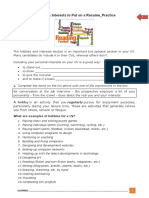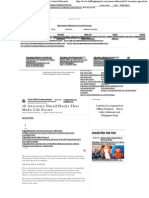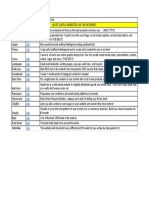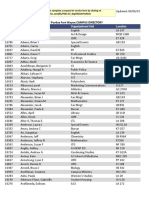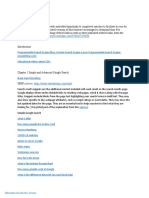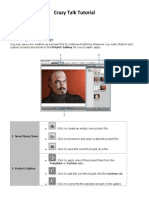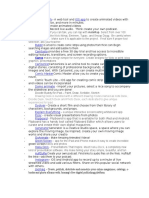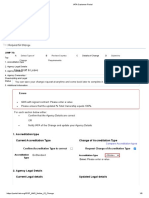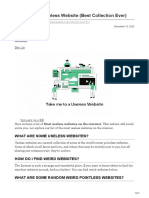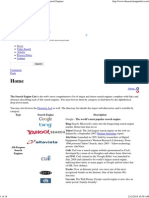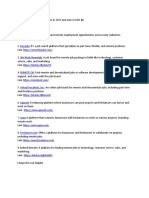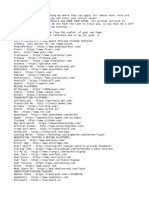8/21/2019 Search operators you can use with Gmail - Gmail Help
Help Center Community
Search operators you can use with Gmail
You can use words or symbols called search operators to filter your Gmail search results. You can
also combine operators to filter your results even more.
How to use a search operator
1. Go to Gmail .
2. In the search box, type the search operator.
Search operators you can use
Tip: Once you do a search using search operators, you can use the results to set up a filter for these
messages.
What you can search by Search operator & example
Specify the sender from:
Example: from:amy
Specify a recipient to:
Example: to:david
Specify a recipient who received a copy cc:
bcc:
Example: cc:david
Words in the subject line subject:
Example: subject:dinner
Messages that match multiple terms OR or { }
Example: from:amy OR from:david
Example: {from:amy from:david}
Remove messages from your results -
Example: dinner -movie
Find messages with words near each other. Use the AROUND
number to say how many words apart the words
Example: holiday AROUND 10 vacation
can be
Example: "secret AROUND 25
Add quotes to find messages in which the word you
https://support.google.com/mail/answer/7190?hl=en 1/4
�8/21/2019 Search operators you can use with Gmail - Gmail Help
dd quotes to d essages c t e o d you
birthday"
put first stays first.
Messages that have a certain label label:
Example: label:friends
Messages that have an attachment has:attachment
Example: has:attachment
Messages that have a Google Drive, Docs, Sheets, has:drive
or Slides attachment or link
has:document
has:spreadsheet
has:presentation
Example: has:drive
Messages that have a YouTube video has:youtube
Example: has:youtube
Messages from a mailing list list:
Example: list:info@example.com
Attachments with a certain name or file type filename:
Example: filename:pdf
Example: filename:homework.txt
Search for an exact word or phrase " "
Example: "dinner and movie tonight"
Group multiple search terms together ( )
Example: subject:(dinner movie)
Messages in any folder, including Spam and Trash in:anywhere
Example: in:anywhere movie
Search for messages that are marked as important is:important
label:important
Example: is:important
Starred, snoozed, unread, or read messages is:starred
https://support.google.com/mail/answer/7190?hl=en 2/4
�8/21/2019 Search operators you can use with Gmail - Gmail Help
is:snoozed
is:unread
is:read
Example: is:read is:starred
Messages that include an icon of a certain color has:yellow-star
has:blue-info
Example: has:purple-star
Recipients in the cc or bcc field cc:
bcc:
Example: cc:david
Note: You can't find messages that you
received on bcc.
Search for messages sent during a certain time after:
period
before:
older:
newer:
Example: after:2004/04/16
Example: before:2004/04/18
Search for messages older or newer than a time older_than:
period using d (day), m (month), and y (year)
newer_than:
Example: newer_than:2d
Chat messages is:chat
Example: is:chat movie
Search by email for delivered messages deliveredto:
Example:
deliveredto:username@gmail.com
Messages in a certain category category:
Example: category:updates
Messages larger than a certain size in bytes size:
Example: size:1000000
https://support.google.com/mail/answer/7190?hl=en 3/4
�8/21/2019 Search operators you can use with Gmail - Gmail Help
Messages larger or smaller than a certain size in larger:
bytes
smaller:
Example: larger:10M
Results that match a word exactly +
Example: +unicorn
Messages with a certain message-id header Rfc822msgid:
Example:
rfc822msgid:200503292@example.com
Messages that have or don't have a label has:userlabels
has:nouserlabels
Example: has:nouserlabels
Note: Labels are only added to a
message, and not an entire conversation.
Note: When using numbers as part of your query, a space or a dash (-) will separate a number while a
dot (.) will be a decimal. For example, 01.2047-100 is considered 2 numbers: 01.2047 and 100.
Was this helpful?
Yes No
English
https://support.google.com/mail/answer/7190?hl=en 4/4











